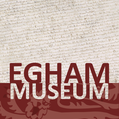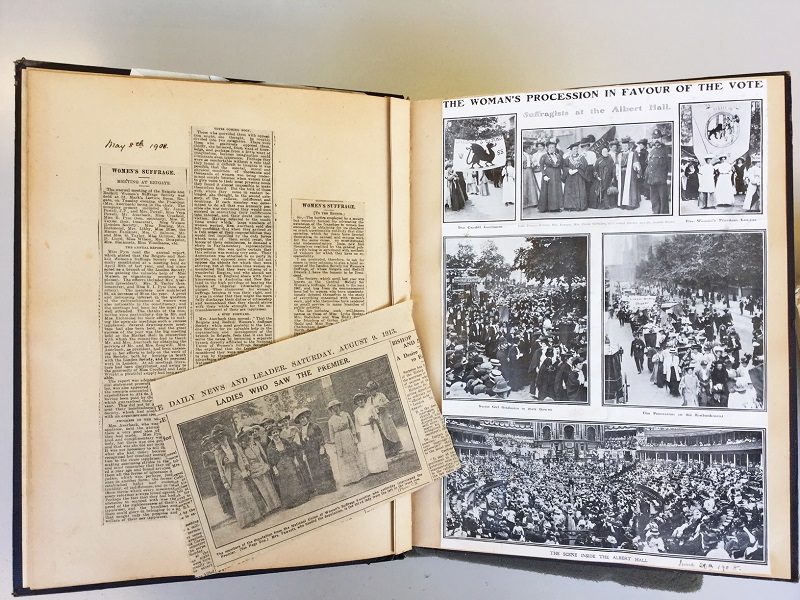Guest Blog: Rosie Everritt from Surrey History Centre
‘The March of the Women: Surrey’s Road to the Vote’ is a project, supported by the Heritage Lottery Fund and based at Surrey History Centre, to mark 2018 as the centenary of the Representation of the People Act 1918, which granted some women over 30 the right to vote in national elections. The project aims to discover and share Surrey’s hugely significant role in the long campaign for women’s suffrage and explore the contributions made by local women and men on both sides of the fierce debate.
Events in Surrey such as suffragette Emily Wilding Davison stepping out in front of the King’s horse at the Epsom Derby and suffering fatal injuries in 1913, and the suffragette bombing of a house being built for Chancellor of the Exchequer David Lloyd George at Walton on the Hill, are well known, but there are many more local stories to be found in the archives.
My role as Project Archivist is to enhance some of the Centre’s existing catalogues to make the records relating to the suffrage movement more accessible. Surrey History Centre houses a wide range of sources for researching the movement in Surrey including both original records and an extensive local studies library available to the public.
I’m currently working on the papers of Dorothy Hunter of Haslemere, suffragist and daughter of Sir Robert Hunter, a co-founder of the National Trust (Surrey History Centre ref 1260), which includes correspondence with the National Union of Women’s Suffrage Societies (NUWSS) President, Millicent Fawcett. Dorothy regularly spoke at meetings and rallies in Surrey and further afield, and the newspaper cuttings in her papers give us a glimpse into her talent as a speaker, with one describing her ‘as the Americans would call “a spellbinder”’.

Scrapbook from the Reigate, Redhill and District Society for Women’s Suffrage (SHC ref 3266/1)
Local organisations are also represented in the collections, including the Reigate, Redhill and District Society for Women’s Suffrage which was affiliated to the NUWSS (SHC ref 3266). This scrapbook, c.1908-c.1913, gives a fascinating insight into their work, including details of their meetings and letters to local, national and international newspapers. One French newspaper cutting included tells us of branch President, Helena Auerbach, visiting women in France to share with them the campaign work going on in Britain. This offers the reader a glimpse into the international conversations going on about women’s rights.
We also hold the research papers of Lewis Orchard, an expert on suffragette, composer, writer and former Frimley and Woking resident, Dame Ethel Smyth (SHC ref 9180). Ethel dedicated two years to the cause and her battle song The March of the Women (our project namesake) was sung by suffragettes during marches all over the country.

Front cover of Ethel Smyth’s composition The March of the Women, dedicated to the Women’s Social and Political Union, 1911 (SHC ref 9180/5)
Surrey was also home to prominent male supporters of women’s suffrage including Frederick Pethick-Lawrence and Thomas, 2nd Baron Farrer. Lord Farrer’s papers include an extensive series of bound letter books which include correspondence with prominent members of the NUWSS (SHC ref 9792).
From the other side of the debate, we have the papers of Bertha Broadwood, of the Broadwood family of piano manufacturers (SHC ref 2185/BMB), who was strongly anti-women’s suffrage. The handbill for a public meeting of the Dorking branch of the National League for Opposing Women’s Suffrage, 1912, held within her papers, includes details of the music and comedy pieces performed during the meeting.

Poster for the meeting of the Dorking branch of the National League for Opposing Women’s Suffrage meeting at Holmwood, 23 Jan 1912, among the papers of Bertha Marion Broadwood, member of the League (2185/BMB/7/1)
These are just a few of the collections that begin to tell the stories of Surrey’s campaigners but you can find a list of more records and a bibliography of published sources, which will be added to as the project develops, here: https://www.exploringsurreyspast.org.uk/themes/people/activists/suffragettes/sources/. Visitors to Surrey History Centre can also enjoy free access to many online sources including The British Newspaper Archive, Ancestry and FindMyPast, which provide a mine of information for this research.
Like Egham Museum, we have a team of dedicated volunteers who have been carrying out research and scouring local newspapers for stories of events, organisations and individuals campaigning both for and against women’s suffrage in Surrey. This includes detailed newspaper reporting on the infamous case of suffragettes setting fire to Trevethan, a house in Englefield Green which belonged to Lady White in 1913. All of this information will be made available on our Exploring Surrey’s Past website in the form of information pages and searchable newspaper indexes. We hope this will help both family and local historians to track down who was involved in local campaigns and where.
For the first time, Surrey History Centre will be working with five partner museums in the county to carry out an audit of the suffrage collections they hold. This information will also be made available on our Exploring Surrey’s Past website with details of how researchers can access them. One of the interesting items held locally includes these incredible stockings embroidered in suffragette colours with the words ‘votes for women’, dated to around 1908-1910, held by Chertsey Museum. Items from these collections and information uncovered over the course of the year will feed into our travelling exhibition at the end of the project which will tour various locations across Surrey.

Suffragette stockings, circa 1908-1910, image courtesy of the Olive Matthews Collection, Chertsey Museum (ref M.2016.31). Photo by John Chase Photography.
The project seeks to bring these local stories to new audiences and provide a legacy for the next generation. Students from three Surrey secondary schools have been working with a local playwright to produce a radio-play podcast about the suffrage movement in Surrey, taking inspiration from our collections. The final edit was fittingly launched at Epsom racecourse, in honour of Emily Wilding Davison, and will go on to form the core of a free online learning resource which will be made available to local schools and students to supplement teaching by providing the local dimension to the national struggle.
To read more about the project, you can visit our website at: https://www.exploringsurreyspast.org.uk/themes/people/activists/road-to-the-vote/. You can also keep an eye on our project blog (https://www.exploringsurreyspast.org.uk/category/march-of-the-women/) and Twitter @MarchoftheWomen as more information about suffrage in your area is uncovered.


